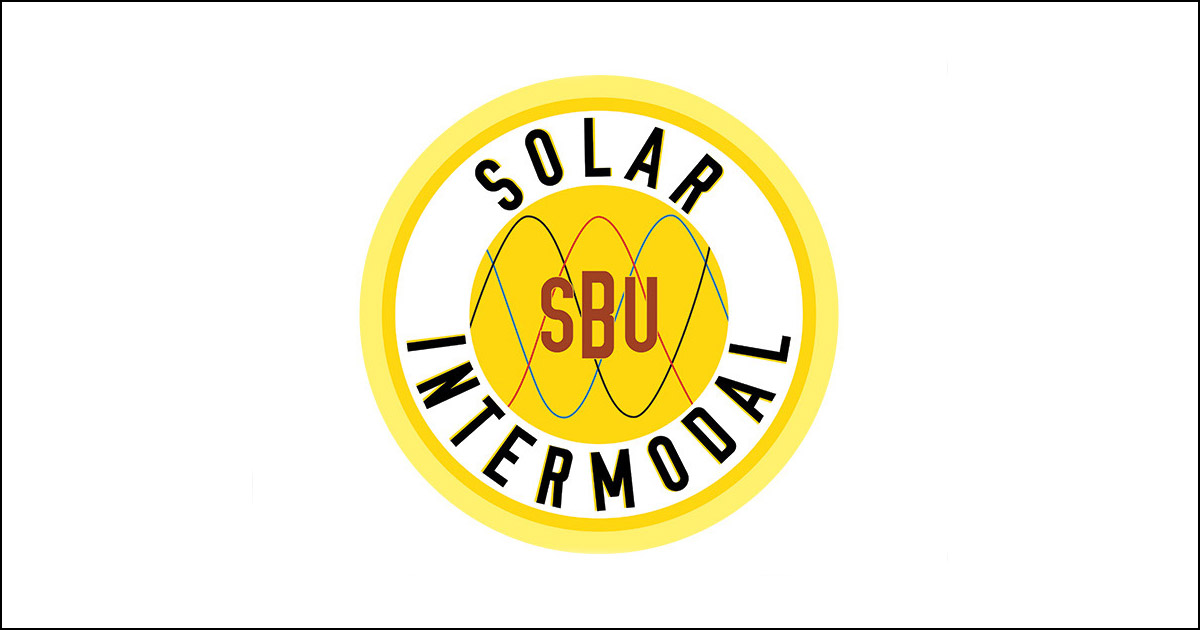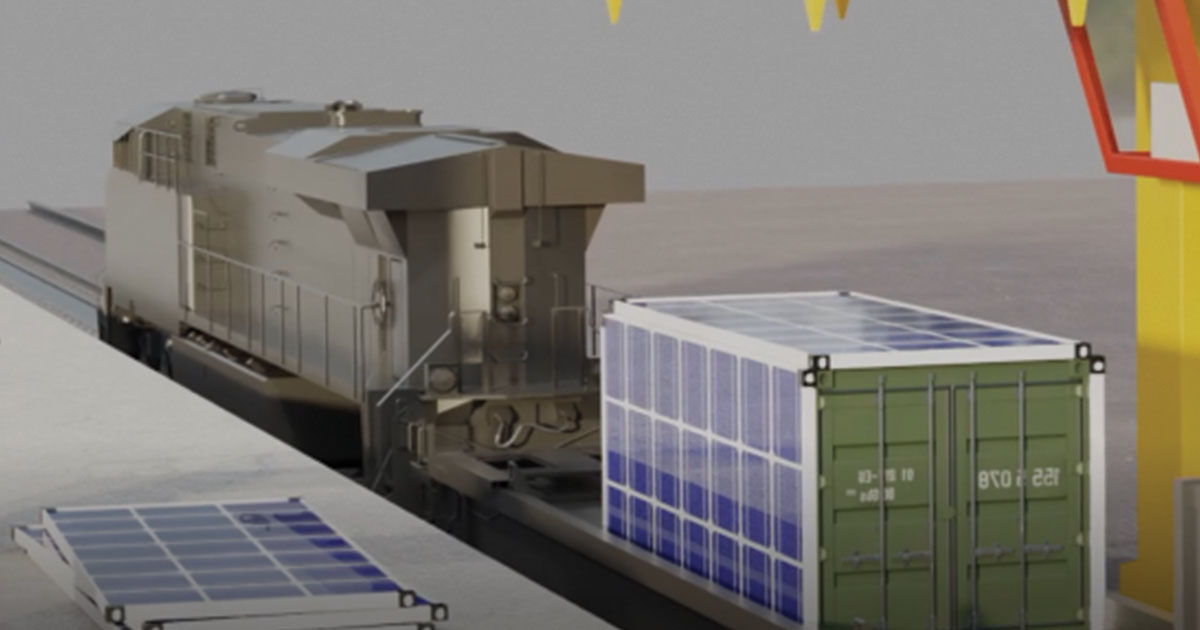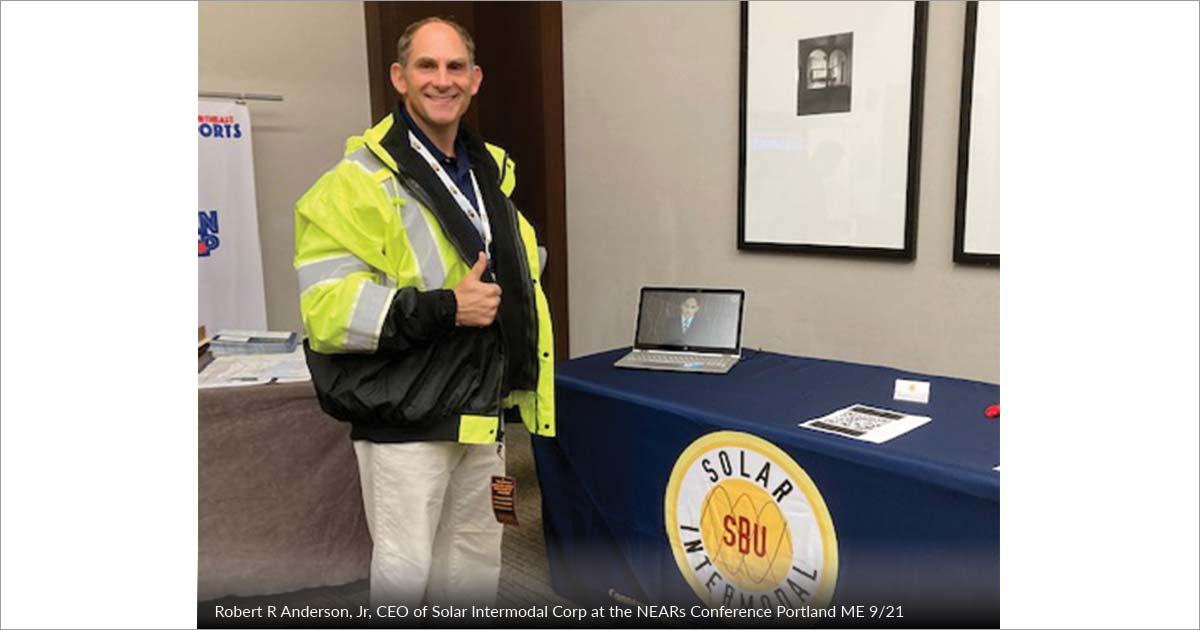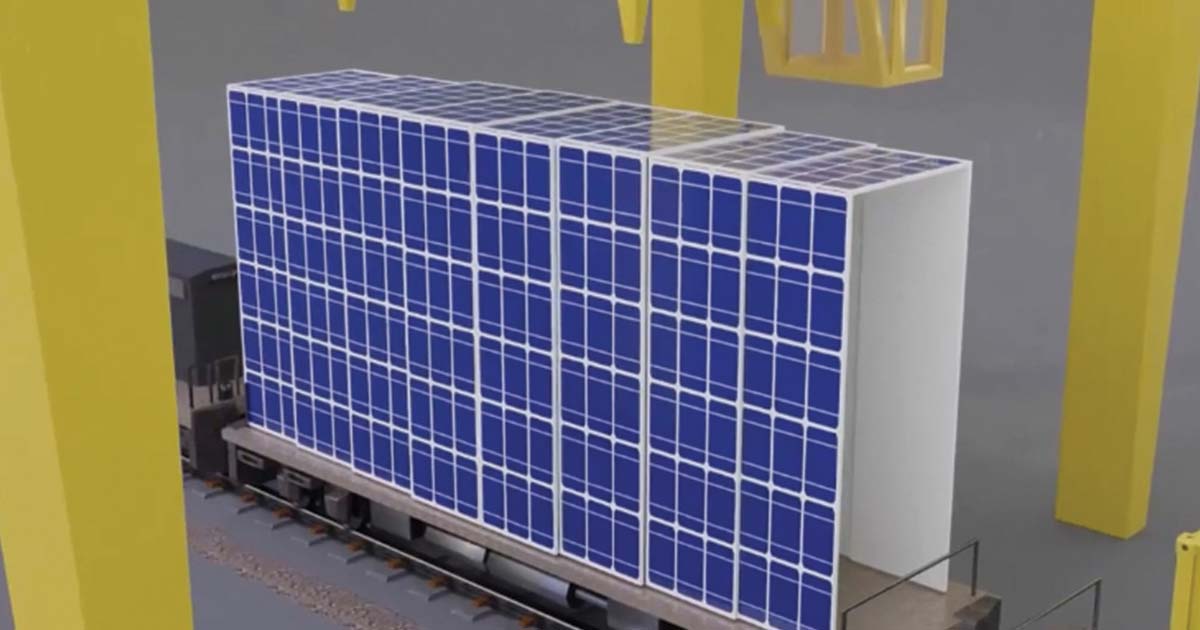Solar Intermodal Profile

Last Updated: By TRUiC Team
The Solar Intermodal Corporation is a sustainable energy startup that attaches solar panel arrays to freight rail cars and tractor trailers to provide an additional, more eco-friendly energy source.
Interview With Robert R. Anderson Jr.
Describe your product or service:
“The SBU System is designed to attach solar panel arrays to freight rail cars and tractor trailers to divide the electric loads of locomotives and power EV trucks.”
Describe your company values and mission:
“To facilitate the transitional economy from carbon-based fuels to the New Climate Economy through the simple implementation of zero-emission technologies in industrial and commercial applications to reduce fuel costs.”
How are you funded? I.e. venture capital, angel investors, etc.
“Reg D angel investors and Reg A+ crowdfunding, minimum investment amount $400.”
How big is your team? Tell us a little about them (I.e. co-founders, freelancers, etc.)
“There are six founders, three board members and two board observers.”
Did you always want to start your own business? What made you want to become an entrepreneur?
“For as long as I could remember, I had always wanted to start, build, and develop a great industrial enterprise. I didn't know in what industry or where.
I grew up in a household of electronics. My father was in the Navy and a communications technician. He worked at ITT and developed the radar system on the SR-71 Blackbird. When time came to go to college or the military I could not decide on what I wanted to do, electrical engineering, civil engineering, or become a pilot. I decided on studying physics since it covers all the basics of science and engineering. After graduating with an undergraduate degree in physics and having trouble finding a job, I sold my landscaping business that I had started, owned, and operated during college to pay for graduate school. I attended NYU at night and earned a Masters in Real Estate Finance. I wanted to own commercial real estate. Little did I know that the primary driving factor behind real estate is debt capital. Unable to acquire real estate because of the over lending and over pricing of properties in the build up to the housing crisis — my first real job was a commercial real estate appraiser. I saw early on the overvaluation of real estate.
At the same time I survived the 9/11 attack in NYC, my building was across the street and I had missed my usual train to work that morning. The oil problems came when it was declared that the US was addicted to oil. News flash, modern society is addicted to oil. I read a book at that time titled the Hydrogen Economy by Jeremy Rifkin. It was a gift to me from our newborn, where I had told her that this is her future. The problem then, the world was not ready for hydrogen. My wife and I had two more girls, three in total, and I had built a career on Wall Street valuing bonds for banks and hedge funds until I automated myself out of a job with a sophisticated pricing system in 2017. COVID changed everything. It had destroyed my financial advisory business, made me realize that I wasn't getting any younger and that your day can be up at any moment. Therefore, I dusted off all my designs, read my notes, and drafted a business plan during the quarantine, and filed a provisional patent. I started Solar Intermodal with a filing in Delaware, worked with Reg D Resources out of Colorado, raised $38,000 in founder equity, and got started.”
How did you come up with your startup idea? How did you decide to actually act on the idea? What gave you confidence that you were on the right track?
“The idea has been brewing in my mind for decades. Everything from installing wind turbines on abandoned rail beds to building a hydrogen pipeline from solar farms in Nevada to the east. During the COVID-19 shutdown, I pieced it all together.
My business and corporate experience taught me that people and organizations like things that are easy and worth billions. I love railroads and used to play a game called Railroad Tycoon in college. I have read countless books on the robber barons, the history of rail, and my favorite, Cornelius Vanderbilt. The forward-thinking he had in the late 1800s to sell his entire steamship enterprise and invest in rail is the kind of forward-thinking that is inspiring.
I have already installed a solar energy system on my private residence. I installed it myself. I knew the railroad industry wasn't even thinking about solar because there has been nothing but gimmicks over the years, and every battery locomotive has been lead acid, and every one of them has caught fire at some point. Railroads have been hiding behind their efficiency for decades. It's time to challenge them. I am also in tune with how Wall Street thinks, and billions of ESG investments are coming. This is the opportunity, and I have something that will be impactful, formidable, and transitional. Something so big and easy to implement that investors can't say no. Now is the time. There is a willingness to do this, and I devised the solution.”
How did you come up with your company name? Did you have other names you considered?
“We wanted something that would describe our goal of making diesel fuel a backup energy source. Intermodal is so specific and unique that it just fits.”
Feeling inspired? Learn how to launch your company with our guide on how to start a startup.
What is the greatest challenge you faced in starting your business, and how did you overcome it?
“The greatest challenge has been stress. The approvals were graciously accepted. We have a lot of work to still do. The stress is a daily grind, but I know we will prevail. We have to. It's now or never for me.
Our project is so big and will have such an impact on the world that it is extremely exciting. Just imagine every freight train in the world using our system as the new global standard. We are talking about making freight trains mobile solar farms. The diesel electric locomotive is the grid signal to the system and the backup engine. Now imagine EV trucks delivering from various distribution centers around the world as well. We would balance out the CO2 emissions in the world. Ships could still operate on diesel because of the offsets we will create in other logistics operations. It's very exciting.
Every great invention has to have a social utility and economic reason to exist. The cost reductions to the operators is our driving factor, and the scalability is the new normal. The best part, there is still more to come ... while sitting idle in the yard, our rail cars can power the grid or power electrolyzers to create green hydrogen, hence our ultimate endgame, the hydrogen economy. Lastly, there are countless ancillary markets to be created from the system. Payment apps for truckers as they sell excess power to the grid while resting and much much more.”
Who is your product or service made for? Who is your target market?
“Railroad operators, logistics companies, rail yards, trucking companies, and ports. Energy is needed everywhere. Our modern society and standard of living [are] based on the use of energy … Unfortunately, entropy plays a large role, and burning diesel wastes a lot of energy. We need fossil fuels for generations to come for all sorts of modern conveniences. It's a shame that we burn them. They should be studied more for innovation. We also need fossil fuels for the production of solar photovoltaic cells. Solar panels are mostly purified silicon, which comes from silicon ingot, which is created by heating sand. We need fossil fuels for other things.
It’s time to replace its use in many areas to advance our entire species on Earth. As we develop this new standard and move closer to a hydrogen economy — which is basically the water cycle — ancillary markets and customers are the steel industry and hospitals in need of oxygen."
What's your marketing strategy?
“To build working prototypes for a national demonstration campaign. As we develop the prototypes, in addition to social media, we plan a train tour across the country. Unfortunately for the EV trucks, there is a lot of ESG marketing and carbon-neutral pledges being made but no EV trucks yet on the road. We had ordered one [to connect] with our trailer model, and a national tour is planned for that as well.”
How did you acquire your first 100 customers?
“There are very few players in this space, and the customers are very large. One has specifically asked to see a working prototype. Therefore, our focus is [on] raising the capital for building that demo. Significant testing is also required. The problem with solar is in the residential market. People who have installed solar on their residence at an appropriate price are generally happy for the most part.
Unfortunately, there are so many installers out there now, [and] most try to make their entire year of profits on one install. Many homeowners overpay for their installation and don't realize it. We decided not to partake in the retail space because of this. Translate that into the utility scale of industrial space, and it's a different ball game. You are talking about big numbers, massive amounts of power, and significant controls on costs — not to mention available financing.
It's a shame that not everyone embraces solar energy. It's all the power we need on Earth for our survival. Blame whomever you want ,we avoid the climate argument. We take our time to rise above it. The population on the Earth is growing, as is the energy demand. Solar energy is a wonderful thing. You don't hear it or smell it. Time to make diesel a backup fuel.”
What are the key customer metrics / unit economics / KPIs you pay attention to to monitor the health of your business?
“The price of diesel fuel and the amount of rail and truck cargo hauled around the country. The prior administration and the current administration proved that the price of diesel can be affected synthetically. When there is a moratorium on drilling for oil or mining for coal, the renewable energy sector is given a boost and gets expensive.
When drilling is open, renewable energy development falls, but if we can develop enough trains with the SBU System, the price of diesel and oil will mean less and less. Savings will be passed onto consumers because surcharges will not be attached to shipments. Shipping rates may be more stabilized, and inflation may also be curbed. Interest rates are also a concern. Our solution takes an expense item on the income statement of a logistics operator and replaces it with a revenue-generating leverage asset. Leverage assets that have fixed and predictable expenses are better for the balance sheet of a company, and any expense eliminated is the same as found revenue, adding to the capitalization of our customers' company values.”
What's your favorite entrepreneurial book and podcast?
“My favorite book is “The Fountainhead,” and my favorite entrepreneurial book is “The First Tycoon,” the story of Cornelius Vanderbilt.”
What is the biggest lesson you learned during your journey?
“Understanding people. Whether someone I work with, works for me, or I work for them. A customer, client, shareholder, or investor. I have had to learn patience, understanding, and communication. I had trouble realizing that I am thinking, manifesting, and planning so far ahead that I have to slow down and clearly share with those around me, but more importantly, to listen to them. Far too many times I disregarded others and failed to realize their potential. I have learned that everyone is valuable.”
Who is your support system?
“The founding angels are my business support and my wife is my challenger. She is the greatest. I am so grateful she is still with me after hearing of all this ambition.”
How do you stay motivated?
“One simple statement, 'I was born to do this...I have been manifesting this my entire life, therefore it must be done.' I remind myself every day of the gifts given to me in having a creative mind and not afraid to try or challenge. I am an Aquarius and have not given it much thought until I learned of the nature of Aquarius being the giver, thriving on big ideas. We need to advance society and rise above the climate argument. Now is the time.”
Did you have to develop any habits that helped lead you to success? If so, what are they?
“Yes, continual drive. What am I going to accomplish today? What needs to be done? What has a deadline or a cost? How can we avoid the cost? Is there a better, easier way to do it? And then, clear your head. Having a clear mind keeps you away from the negative energy. Action helps clear your mind. Exercising helps with clearing your mind. Stop watching TV. Stop watching social media. Get out there to get it done. How many times are you going to watch Ironman or Endgame?”
What are you most proud of as an entrepreneur?
“To date, the speed of our first capital raise and the approvals we have obtained.”
Recommended:
- Keep up with more startup companies by visiting our list of the top startups to watch.
- Hear startup stories from real founders on the Startup Savants podcast.
- Form your own startup by reading our review of the best online incorporation services.
Tell Us Your Startup Story
Are you a startup founder and want to share your entrepreneurial journey withh our readers? Click below to contact us today!
More on Solar Intermodal

This Founder Wants to Make the Railroad System Sustainable
Robert R. Anderson Jr., founder of Solar Intermodal, has a solution to make railroads more environmentally friendly than ever before.

Insights From the Founder of Renewable Energy Startup Solar Intermodal
We were fortunate enough to hear some valuable insights during our interview with Robert R. Anderson, Jr. of solar energy startup Solar Intermodal that will inspire, motivate, and teach aspiring and established entrepreneurs alike.

5 Ways to Support Renewable Energy Startup Solar Intermodal
We have developed this list of five creative and impactful ways to support solar energy startup Solar Intermodal.


